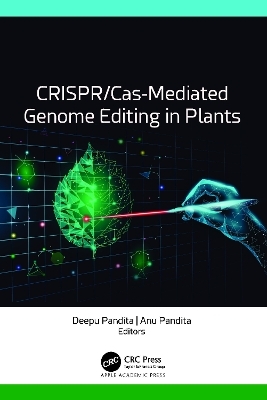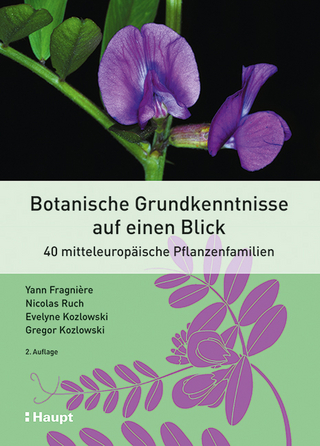
CRISPR/Cas-Mediated Genome Editing in Plants
Apple Academic Press Inc. (Verlag)
978-1-77491-212-6 (ISBN)
With over 820 million people facing hunger in today’s world, the need of the hour is the design of plant varieties with high yield, improved traits, and resistance properties in order to mitigate the detrimental impacts of biotic and abiotic stress conditions on food crops. This volume highlights the use of Clustered Regularly Interspaced Short Palindromic Repeats (CRISPR) and CRISPR-associated nuclease proteins as a solution for sustainable agriculture. CRISPR/Cas-mediated genome editing (GE) provides a robust, simple, precise, efficient, economical, and revolutionary toolbox that leads to improved plant traits with enhanced yield, quality, and resistance against various stresses, including climate-related stress, insect pests and diseases, pollution-related stresses, etc.
Key features of the book:
Explains the differences between conventional breeding, genetically modified crops, and genome editing approaches using CRISPR/Cas
Introduces the tools of genome editing, such as ZFNS (zinc finger nucleases), mega nucleases, and TLENS (transcription activator-like effector nucleases)
Covers the history, origin, discovery, structure, and classification of CRISPR/Cas
Examines the databases and computational approaches of CRISPR/Cas
Highlights genome editing of important crop plants with CRISPR/Cas systems, including wheat, maize. tomato, Brassica crops, rice, fruits
Explores potential applications of CRISPR/Cas systems for climate smart crops
Deepu Pandita is a Senior Lecturer in the Government Department at the School of Education, Jammu and Kashmir, India. Deepu Pandita has more than 20 years of teaching experience and has presented her research at national and international conferences. Deepu Pandita was awarded a Best Oral Presentation award at an International Conference on Biotechnology for Better Tomorrow, a Women Researcher Award and a Research Excellence Award from two professional associations in India. Deepu Pandita acts as a reviewer, associate editor, and editor of several international journals. Deepu Pandita has published several editorials, book chapters, reviews, and research articles in journals of national and international repute. Anu Pandita is a dietician at the Vatsalya Clinic, New Delhi, India. Previously she worked as a lecturer at the Bee Enn College of Nursing, Talab Tillo, Jammu, India, and as a Dietician at the Ahinsa Dham Bhagwan Mahavir Charitable Health Centre, New Delhi, India. Anu Pandita conducted a case study at the Pediatric Gastroenterology Ward at Nehru Hospital on a patient suffering from chronic liver disease. Anu Pandita has published edited books, book chapters, and research articles in journals of national and international repute. Anu Pandita also has various books in the process of production. Anu Pandita has presented her research work at both the national and international conferences.
PART I: INTRODUCTION TO GENOME EDITING TOOLS 1. Conventional Breeding, Genetically Modified Crops, and Genome Editing 2. An Overview of Tools for Genome Editing: ZFNs, Mega Nucleases, and Talens 3. Clustered Regularly Interspaced Short Palindromic Repeats/CRISPR-Associated (CRISPR/Cas) Systems: Discovery, Structure, Classification, and General Mechanism 4. Computational Tools and Approaches for CRISPR-Cas Technology PART II: GENOME EDITING OF CROP PLANTS WITH CRISPR/CAS SYSTEMS: PAST, PRESENT, AND FUTURE 5. Genome Editing Using CRISPR/Cas9 System for Crop Improvement, Nutrient Enrichment, and Abiotic Stress Tolerance in Rice 6. Genome Editing of Wheat with CRISPR/Cas Systems: Past, Present, and Future 7. Genome Editing of Maize with CRISPR/Cas System: Past, Present, and Future 8. Genome Editing of Tomato Crop with CRISPR/Cas Systems: Past, Present, and Future 9. Genome Editing Techniques and Their Applications in Brassica Crops Improvement PART III: POTENTIAL APPLICATIONS OF CRISPR/CAS SYSTEMS FOR CLIMATE SMART CROPS 10. CRISPR/Cas-Mediated Genome Editing for Abiotic Stress Tolerance 11. CRISPR/Cas-Mediated Genome Editing for Biotic Stress Tolerance 12. CRISPR/Cas-Mediated Genome Editing for Improvement of Plant Traits 13. Investigation of Plant-Microbe Interactions by CRISPR/Cas for Sustainable Agriculture 14. Unravelling the Application of CRISPR/Cas System in Natural Product Research 15. Unravelling the Promise of CRISPR/Cas System in Modulating Nutrients and Antinutrients in Fruits 16. CRISPR-Cas-Based Strategies for Resistance against Plant Viruses 17. Regulatory Status of CRISPR/Cas Genome-Edited Crops
| Erscheinungsdatum | 11.07.2023 |
|---|---|
| Zusatzinfo | 24 Tables, black and white; 10 Illustrations, color; 17 Illustrations, black and white |
| Verlagsort | Oakville |
| Sprache | englisch |
| Maße | 156 x 234 mm |
| Gewicht | 940 g |
| Themenwelt | Naturwissenschaften ► Biologie ► Botanik |
| Technik | |
| Weitere Fachgebiete ► Land- / Forstwirtschaft / Fischerei | |
| ISBN-10 | 1-77491-212-0 / 1774912120 |
| ISBN-13 | 978-1-77491-212-6 / 9781774912126 |
| Zustand | Neuware |
| Informationen gemäß Produktsicherheitsverordnung (GPSR) | |
| Haben Sie eine Frage zum Produkt? |
aus dem Bereich


